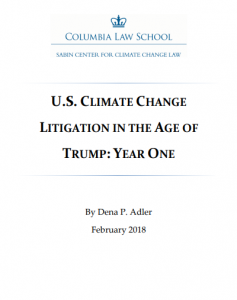Full Title: U.S. Climate Change Litigation in the Age of Trump: Year One
Author(s): Dena P. Adler
Publisher(s): Sabin Center for Climate Change Law, Columbia Law School
Publication Date: February 1, 2018
Full Text: Download Resource
Description (excerpt):
In its first year, the Trump Administration undertook a program of extensive climate change deregulation. The Administration delayed and initiated the reversal of rules that reduce greenhouse gas (GHG) emissions from stationary and mobile sources; sought to expedite fossil fuel development, including in previously protected areas; delayed or withdrew energy efficiency standards; undermined consideration of climate change in environmental review; and hindered adaptation to the impacts of climate change. However, the Trump Administration’s efforts have met with constant resistance, with those committed to climate protections bringing legal challenges to many, if not most, of the rollbacks.
This paper seeks to give shape to the current moment in climate change litigation, categorizing and reviewing dozens of climate change cases filed during 2017 to understand how litigation countered—and at times courted—the influx of climate change deregulation during the first year of the Trump Administration. The analysis focuses specifically on “climate change cases,” defined as cases that raise climate change as an issue of fact or law. From the U.S. Climate Change Litigation database, maintained by the Sabin Center for Climate Change Law and Arnold & Porter, this analysis identified eighty-two climate change cases as responsive or relevant to federal deregulation of climate change policy in 2017. To explain the effects of climate change litigation in 2017, this paper sorted cases into five categories:
1. Defending Obama Administration Climate Change Policies & Decisions;
2. Demanding Transparency & Scientific Integrity from the Trump Administration;
3. Integrating Consideration of Climate Change into Environmental Review &
Permitting;
4. Advancing or Enforcing Additional Climate Protections through the Courts; and
5. Deregulating Climate Change, Undermining Climate Protections, or Targeting
Climate Protection Supporters.
The first four categories are “pro” climate protection cases—if their plaintiffs or petitioners are
successful they will uphold or advance climate change protections. The fifth category contains “con” cases—if their filing party or parties are successful, these cases will undermine climate protection or support climate policy deregulation. Sixty of the reviewed cases were “pro” climate protection and twenty-two were “con.”
